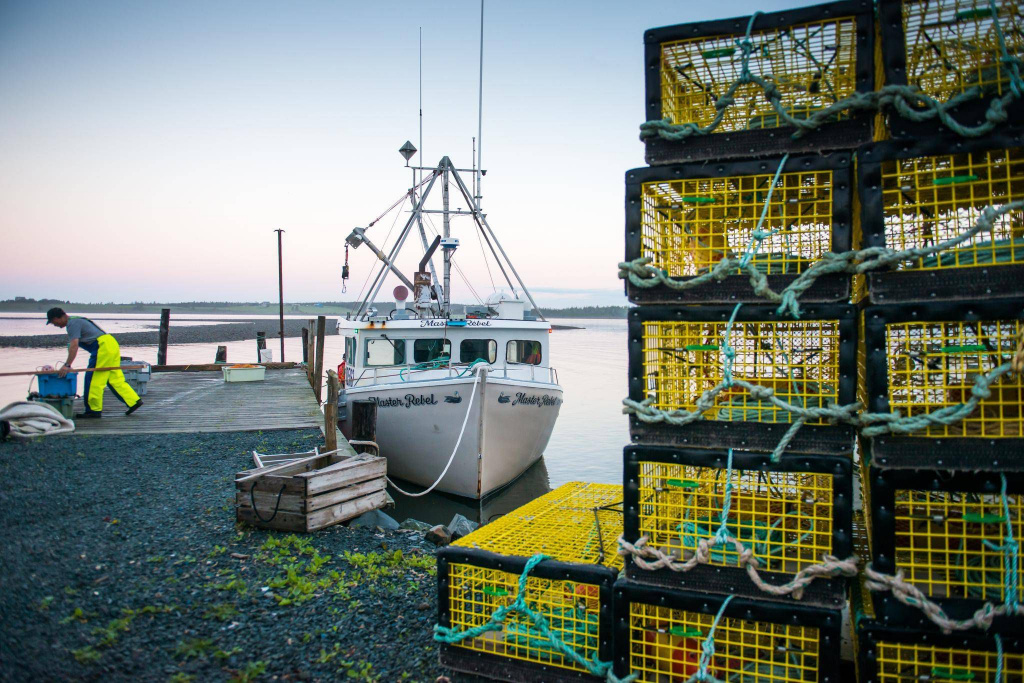John Sutcliffe, hometown — Halifax, Executive Director of the Canadian Council of professional fishermen

About career choice
Many Canadians love sport fishing, but only a few are licensed and trained fishermen. Fishermen work in a limited number of regions across Canada. I grew up in one of those places. We catch for a living.
For Canadians, fishing is a lifestyle as well as the career of an office worker. We like to work independently, to be in swimming for a long time.
There are several seasonal windows when fishing is allowed. The season can last from a few months to a couple of days a year. So most of the year we have extra work to do.
About the features
West Coast of Canada used to make bumper stickers on cars: «The worst day fishing is better than the best day at work.» We have special working space and attractive working conditions.
Due to the short fishing season, we carefully prepare for the start. All equipment must be serviceable, and the fisherman in good physical shape. During the season, you can not afford to stand idle due to breakage for several weeks. Because you can lose half of the annual income.
«The worst day fishing is better than the best day at work»
The fishing industry in Canada strictly regulated by law. Commercial fishermen can only swim with a pack of documents, license and certificates. The captain of the vessel must ensure safety on board for the entire crew and undergo special training. One person on board must undergo first aid training. And fishermen have a certificate confirming they have been trained in skills during emergencies at sea. A fishing license is obtained online through special websites Fisheries and Oceans Canada.

Educational institutions have large fishing communities and specialities, for example, in College Camosun in British Columbia. There is Institute of marines and fisheries in Newfoundland, a fishing school in Quebec and Caraquet.
About earnings
Crew members have a rate of $200 — $250 per day, someone agrees 5-20% of the catch. Some fisheries have the opportunity to earn on $40,000 — $50,000 for a couple of months of work.
The money goes not only for the living but also on maintenance and preparation of ship equipment. Most Canadian fishermen start their day at dawn.
This industry has a feature of assets transfer between generations. If you're not from a fishing family or community, getting financial help at the start and entering the industry is difficult.
About the prospects
In this industry, success depends on many factors beyond the control of the fisherman. Wages vary between regions and are related to seasonal conditions and weather. But fishermen can earn even more than office employees of large companies and work only a few months. I see a great prospect in this.
Rose Dykstra, 31 years old, hometown — Vancouver, The Front Yard Flower Co @thefrontyardflowerco

About career choice
We live in a private house. When moved to the region on the West Coast of Canada we planted vegetables, potatoes, spinach in the garden. This is a great advantage to have a garden and always fresh products.
Urban farming is popular among Canadians.
The idea of a flower farm arose in early spring of 2017. We considered all the potential opportunities to enter the local farmers market. I worked as a wedding photographer and liked textured bouquets. It occurred to me that it might be possible to combine textured bouquets with a small farm in the garden.
We own an agricultural company in Vancouver. It's a city flower farm and a family business. Someone is engaged in research and selection of the best seeds, and someone builds greenhouses and takes care of plants.
About the features
There are tax-related benefits for farmers. However, it all depends on the region where you live. Meat products, fresh vegetables and greens are in demand in Canada. The best thing here is the conditions and nature. Many lands are favourable for farming and cattle breeding. Most often, immigrants or newcomers from other regions who are tired of big cities are engaged in such business.
Flowers are one of the most profitable plants
If you love gardening and want to turn the hobby into an additional income, then it is possible on the Canadian market. Flowers are one of the most profitable plants. For a farmer, it is common to sell more than a thousand stems a day at the farmer's market.

About earnings
On average, a farmer can earn about $14 — $15 per hour. If you are experienced professional — $20 per hour. The real money comes when you own not only a farm but also a flower shop.
About the prospects
In Canada growing movement of people who return to work on the land, buy farms and move. Being a farmer is a pleasant and exciting job. We see small seeds turn into tall flowers. We make flower bouquets that give positive emotions to customers. Farmers in Canada have everything from industry support to their own farmers' fairs. People appreciate the beauty and local product, so the prospects in this business are great.
Lacey Rose, hometown — Banff, Co-founder of Women In Wood

About career choice
I grew up in Northern Canada, where most of the forest sectors. Although I lived near such nature, I knew nothing about forestry management and the profession of a forester. In College one of the biology professors asked me if I wanted to go to forestry school. I was successful in biology and related subjects lived in a suitable region, and thought I would be interested in forestry.
Forester is professionally responsible for the care, planting and management of forestry and trees
Forester is professionally responsible for the care, planting and management of forestry and trees. We have many responsibilities, including restoration, conservation, timber harvesting and management of protected forest areas.
About the features
The forest industry in Canada is well developed. But there is always a serious shortage of skilled workers. Because young people do not want to choose such a profession and adults retire. If we want the forest to remain in good hands, we need communities and associations that will share with people that a forestry is a good option for earning and working. Our community explains how each person can influence the condition of nature.
I like being in the woods as long as possible. I started with urban tree care in Denver, Colorado, then moved on to survey forestry and arboreal plants in Northern Ontario. To work in this area is not required, but desirable bachelor's degree in forest management and natural resources, in the field of wildlife. Foresters work in timber companies, as well as in state parks and institutions. I am a registered professional forest ranger specializing in forest planning.
About earnings
Foresters in the first few years of work can earn from $32,000 to $48,000 per year. A forester with years of experience and education can earn between $50,000 and $90,000 a year.
The highest average hourly wage in Alberta is $47.24 per hour, and the lowest is $33.65 per hour.
About the prospects
Prospects for employment in Canada are good. The government is increasingly funding this sphere.









